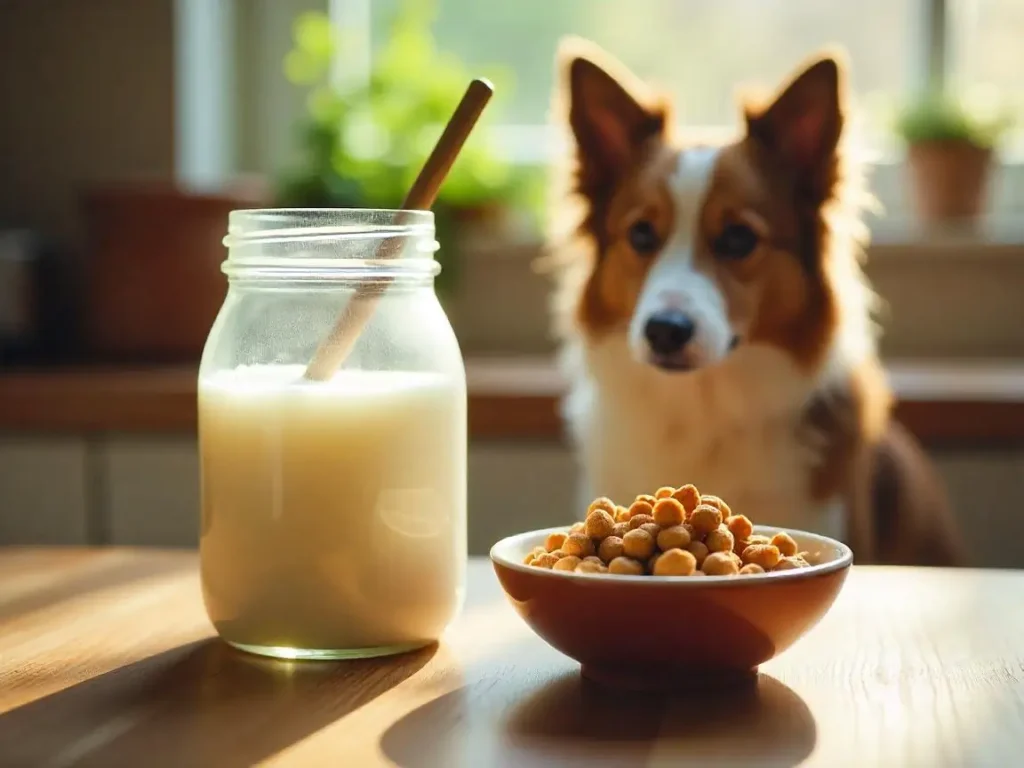When it comes to enhancing your furry friend’s diet, the answer is a resounding yes. Kefir can be an incredibly beneficial probiotic supplement for dogs when introduced thoughtfully and in careful moderation. Originating from the Northern Caucausus region of Russia, this fermented dairy drink has traveled across the world as a potent source of gut-boosting nutrition, packed with essential vitamins and minerals that can support your canine companion’s overall health. As a passionate advocate for pet wellness who has personally navigated the complex landscape of veterinary nutrition, I’ve witnessed how this traditional beverage, whether made from cow’s milk, goat’s milk, or even non-dairy alternatives like coconut milk and rice milk can transform a dog’s stomach health, especially for those who might be lactose-intolerant. This comprehensive guide will explore the remarkable benefits of kefir, diving deep into its nutritional profile, highlighting its calcium content, and providing pet owners with practical insights on incorporating this nutritious supplement into their dogs’ daily routine, ensuring a holistic approach to canine wellness through carefully selected probiotics and fermented food sources.
Table of Contents
What Makes Kefir a Canine Superfood?
As a fermented dairy enthusiast who’s spent years exploring the world of fermented products, I’ve discovered kefir is more than just a trendy drink – it’s a nutritional powerhouse that can benefit our furry friends. Originating from the Russia and Northern Caucasus regions, this traditional beverage is a sour, tart, and fizzy drink created through a fascinating process involving cauliflower-like grains packed with a complex bacterial microcolony. These magical grains host unique microorganisms like Lactobacillus kefiranofaciens and Saccharomyces turicensis that transform milk into a nutritional elixir through fermentation.

The magic happens when these microscopic heroes metabolize the drink over 12-24 hours, creating a thinner, more watery probiotic drink that’s quite different from yogurt. Whether made from cow, goat, or sheep’s milk, or even plant-based alternatives like coconut, oats, or rice milks, kefir stands out by breaking down lactose and producing lactic acid and carbon dioxide. This process not only makes it easier to digest but also creates a probiotic-rich drink that can support your dog’s digestive health, boost immunity, and provide essential nutrients that go beyond what typical dog supplements offer.
The Health Benefits of Kefir for Dogs
As a passionate pet nutrition enthusiast who’s explored countless fermented beverages, I’ve discovered that kefir is more than just a trendy health drink, it’s a powerhouse of wellness for our canine companions. This traditional probiotic marvel, originating from the Caucasian Mountains, carries a rich legacy of healing that extends far beyond human consumption.
Kefir boasts an impressive array of health benefits for dogs, packed with 61 strains of bacteria and friendly yeasts that can transform your furry friend’s overall well-being. Here’s a breakdown of how this fermented drink can support your dog’s health:
- Digestive Health:
- Balances gut bacteria
- Reduces diarrhea
- Combats parasites
- Alleviates digestive disorders
- Supports gut flora restoration
- Immune System:
- Strengthens immune system
- Fights antibacterial challenges
- Helps combat Salmonella
- Reduces inflammatory reactions
- Supports natural disease resistance
- Skin and Coat:
- Improves skin health
- Reduces allergies
- Enhances coat shine
- Supports overall dermatological wellness
- Breath and Oral Health:
- Freshens bad breath
- Reduces oral bacteria
- Supports overall mouth hygiene
- Joint and Mobility Support:
- Helps older dogs with joint disease
- Provides bone health support
- Improves calcium metabolism
- Supports vitamin K2 absorption
- Mental and Emotional Wellness:
- Reduces anxious behaviour
- Helps manage stress
- Supports senior dogs’ mental clarity
- Comprehensive Nutritional Boost:
- Rich in vitamin B complex
- Contains calcium, phosphorus, magnesium
- Provides probiotic organisms
- Supports overall nutritional balance
The magic of kefir lies in its ability to work holistically, transforming your dog’s internal ecosystem with its powerful probiotic punch. From supporting gut health to boosting immune system function, this fermented wonder is nature’s gift to canine wellness.
Navigating Kefir Safety for Your Canine Companion
As a passionate fermented food enthusiast who’s spent years studying canine nutrition, I’ve learned that while kefir can be a fantastic addition to your dog’s diet, it’s not a one-size-fits-all solution. Lactose intolerant dogs might struggle with traditional milk-based kefir, especially those made from cow, sheep, or regular dairy sources. The probiotics and microorganisms that make kefir beneficial can sometimes cause more harm than good for sensitive pups. Dogs with specific health conditions or those on antibiotics should approach kefir with extra caution, always consulting their veterinarian first.

The key is understanding your dog’s individual needs and introducing kefir with moderation. Start with small amounts of plain, unflavored kefir preferably from goat’s milk or alternative sources like coconut or rice milk and watch for any signs of stomach upset or gas. Pay special attention to dogs with sensitive digestive functioning, as the fermented nature of kefir can be challenging for some. I recommend beginning with just a few drops for small dogs (16-32lbs), gradually increasing to a teaspoon for medium dogs (32-48lbs), and no more than a tablespoon for large dogs (48-64lbs). Always introduce new foods slowly, and if you notice any adverse reactions like excessive fizzy behavior or digestive distress, discontinue use and speak with your vet.
How Much Kefir Should I Give My Dog?
Understanding the right amount of kefir for your furry friend can be tricky, but don’t worry. As a pet parent who’s navigated the world of canine nutrition, I’ll break down the perfect probiotics dosage that keeps tails wagging and stomachs happy. Dogs of different sizes have unique needs, so let’s dive into a simple serving guide that ensures your pup gets just the right amount of this nutritious fermented drink.
For small dogs under 16 lbs, start with a teaspoon-full of unsweetened, unflavored kefir – about 1/4 to 1/2 teaspoon daily. Medium-sized pups between 16-32 lbs can handle 1-2 teaspoons mixed into their daily diet. Larger dogs weighing 48-64 lbs might enjoy up to 2-3 teaspoons, while big buddies around 80-100 lbs can have up to 4 teaspoons. Pro tip: introduce kefir slowly to help your dog tolerate this new treat, especially if they’re dealing with stress, illness, or recovering from antibiotics. Mix it into their regular meal, hide it in puzzle toys or a KONG, or create fun pupsicles with fruit like blueberries, melon, or apples in ice cube trays. Watch for any signs of stomach upset, nausea, or diarrhea – if these occur, reduce the amount or stop completely. A gentle probiotic boost should never cause discomfort!
How to Introduce Kefir to Your Dog’s Diet?
As a passionate researcher of fermented foods, I’ve discovered that adding kefir to your dog’s nutritional arsenal can be a game-changer. Originating from the Northern Caucausus in Russia, this world-renowned probiotic powerhouse offers a treasure trove of vitamins and minerals that can transform your furry friend’s health. Whether you’re considering goat’s milk, cow’s milk, or non-dairy alternatives like coconut milk or rice milk, introducing kefir requires a strategic and careful approach.

Start by choosing a low lactose or lactose-intolerant-friendly option, tailoring it to your dog’s specific needs. For small dogs, begin with a tiny teaspoon, while medium and large dogs can handle up to a tablespoon in moderation. Mix the kefir into their regular meals or serve it separately, watching closely for any digestive reactions.
Pro tip: Combine with nutritious mix-ins like mashed bananas or pureed apples to make it more appealing. Always consult your veterinarian before making significant changes to your dog’s diet, and remember that probiotics from fermented vegetables like sauerkraut or even mushrooms can be excellent complementary options.
Can I Make Homemade Kefir for My Dog?
As a fermented dairy enthusiast who’s been crafting kefir in my home kitchen for years, I’ve learned that making kefir for your furry friend can be both cheap and rewarding. The process is surprisingly simple: you’ll need kefir grains, some milk, and a few basic tools like glass jars, coffee filters, and a rubberband.
Creating homemade kefir starts with sourcing quality kefir grains. I recommend purchasing from a reputable online seller or local store. You’ll want to use a clean glass jar or plastic container (avoid metal which can interfere with fermentation). Simply add about a tablespoon of kefir grains to a cup of dairy or plant-based milk, cover with a breathable coffee filter secured by a rubberband, and let it ferment for 24 hours. The liquid will become thickened and slightly soured, turning a white or yellow color. Use a metal strainer to strain the grains, then refrigerate the finished kefir. These kefir grains can reproduce and be used again for two weeks to three weeks, essentially doubling your initial investment. Always watch for any signs of spoilage and ensure the kefir looks and smells fresh before serving to your dog.
Best Types of Kefir for Dogs
When it comes to choosing the right kefir for your furry friend, understanding the fundamental principles of this fermented wonder is crucial. As a pet owner who’s navigated the world of canine nutrition, I’ve learned that not all kefir is created equal. The magic lies in the kefir grains, those miraculous clusters of bacteria and yeast that transform ordinary milk into a probiotic powerhouse.
Let’s break down the kefir landscape for dogs. Milk kefir from goats offers a gentler alternative to cow’s milk, especially for dogs with sensitive stomachs. I typically recommend starting with plain, unsweetened varieties to avoid unnecessary additives. Water kefir made with water kefir grains in sugar water can be an interesting option, but it’s less nutritionally dense for dogs. When selecting kefir, steer clear of flavored commercial options packed with artificial fruit additives or excessive sugars. The key is simplicity – look for pure, minimally processed kefir with no added ingredients. Pay attention to storage needs to maintain the kefir’s probiotic integrity, keeping it refrigerated and checking expiration dates carefully. Some dogs might tolerate low-fat versions better, while others thrive on whole milk kefir. For pups with dairy sensitivities, coconut kefir provides a dairy-free alternative that can still deliver beneficial probiotics.
Ways to Add Kefir to Your Dog’s Diet
Adding kefir to your dog’s meals can be more exciting than just pouring it over their food. My favorite way is making frozen kefir treats by pouring plain kefir into ice cube trays with a small piece of banana or blueberry inside. Once frozen, these make perfect summer treats that help dogs stay in good shape while cooling down. Another simple option is mixing kefir with dog-safe fruits like blueberries, apples, or bananas for a healthy snack that most pups find irresistible.
For dogs that need medication, kefir works wonderfully as a pill disguise – just hide the pill in a spoonful of thick kefir and watch how easily they take their medicine. You can also create a delicious kefir-based gravy for kibble by mixing a few tablespoons of kefir with a bit of low-sodium chicken broth. My Labrador particularly loves when I make homemade dog treats with kefir – simply mix kefir with whole wheat flour, an egg, and a bit of peanut butter, then bake until firm. These treats stay fresh when you store carefully in a clean glass jar with a lid in the fridge, where cold temperatures slow down bacteria growth and pause activity of the probiotics.
How Kefir Transformed Dogs’ Health
Many dog owners have seen remarkable improvements after adding kefir to their pets’ diets. Take Sarah’s story about her Labrador with recurring digestive issues. After introducing small amounts of plain, unflavored kefir made from cow milk, her dog’s sensitive stomach problems disappeared within weeks. The probiotic-rich drink, which originated in the Northern Caucasus region of Russia, helped restore her dog’s gut bacteria balance that had been depleted following a round of antibiotics.

Another pet parent reported that her lactose intolerant Border Collie thrived on goat’s milk kefir, which contains less lactose than traditional milk varieties. The fermented beverage, created using cauliflower-like grains containing Lactobacillus kefiranofaciens and other microorganisms, significantly improved her dog’s coat condition and reduced skin allergies. Local vet Dr. Johnson confirms these benefits aren’t surprising, noting that the 61 strains of beneficial bacteria in kefir support immunity and overall gut health. She recommends starting gradually with small portions based on weight: 1 teaspoon for dogs weighing 16-32lbs, 2 teaspoons for 32-48lbs, 1 tablespoon for 48-64lbs, and slightly more for larger breeds (64-80lbs and 80-100lbs). The slightly sour, fizzy nature of kefir comes from ferments producing carbon dioxide and lactic acid, creating a drink rich in calcium, protein, magnesium, potassium, and vitamins K, B12, and B2 that helps dogs recover from physical stress better than many commercial probiotic supplements. For dogs who don’t tolerate dairy well, alternatives like coconut or rice milk kefir can provide similar benefits without causing stomach upset or gas.
Conclusion
Adding kefir to your dog’s diet might just be one of the best decisions you’ll make for their health. This fermented wonder from Russia packs incredible benefits from supporting digestive functioning to boosting immunity and improving skin and coat health. Remember to start gradually with small amounts based on your dog’s size, whether they’re 16-32lbs or up to 80-100lbs, and always choose plain, unflavored options. I’ve seen firsthand how the probiotics in kefir can transform a dog’s health – from soothing sensitive stomachs to helping recover after antibiotics use. If your pup is lactose intolerant, consider goat’s milk or coconut alternatives which still deliver those beneficial microorganisms without the digestive upset. Before adding this sour, fizzy drink to your dog’s routine, check with your vet – especially if your furry friend has existing health conditions. When introduced thoughtfully, the probiotic power of kefir with its 61 strains of beneficial bacteria and rich content of calcium, protein, magnesium, potassium, and vitamins K, B12, and B2 can be a game-changer for your dog’s wellbeing.
FAQs
Is kefir safe for puppies?
Yes, puppies can enjoy kefir in very small amounts, but start even more gradually than with adult dogs. I usually recommend waiting until puppies are at least 8 weeks old before introducing any fermented foods.
Can kefir help with my dog’s bad breath?
Absolutely! The beneficial microorganisms in kefir can help balance mouth bacteria that cause bad breath. My neighbor’s German Shepherd had terrible breath until she started adding a teaspoon of kefir to his meals.
How long does it take to see benefits from kefir?
Most dog owners notice improvements within 2-3 weeks of consistent use. The probiotic effects on gut health typically show up first, with skin and coat benefits following after about a month of regular use.
Can kefir help overweight dogs?
While not a weight-loss miracle, kefir can support metabolism and digestion, which may help with weight management. The protein and nutrients like calcium, magnesium, and potassium can support healthy muscle function during exercise.
Is kefir good for dogs with sensitive stomachs?
It can be wonderful for sensitive stomachs, but you must introduce it very slowly. Start with just a few drops, especially for smaller dogs (16-32lbs). Many of my clients with sensitive pups have had success with goat’s milk kefir rather than cow or sheep milk varieties.
Can kefir replace probiotics prescribed by my vet?
I wouldn’t recommend replacing prescribed probiotic supplements without consulting your vet first. While kefir contains impressive Lactobacillus kefiranofaciens and many other beneficial bacteria that produce lactic acid, prescription probiotics are formulated for specific conditions and dosages.

Hi, I’m Natalia Smith, a kefir enthusiast and content writer dedicated to making fermented dairy approachable and enjoyable. My journey with kefir began in my own kitchen, experimenting with recipes and sharing the health benefits I discovered. Through hands-on experience and continuous learning, I aim to provide clear, trustworthy information that helps others embrace the goodness of kefir in their daily lives.
